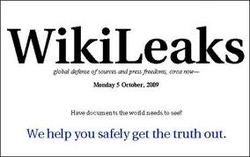On 10 September 2012, Ofcom rejects complaint of Julian Assange, formed for invasion of privacy
http://www.thejournalofregulation.com/spip.php?article1611

The creator of Wikileads, Julian Assange, has been the subject of a documentary which was screened on British television Channel 4, in which he is seen dancing in a night club. Believing that there is a violation of his privacy, he seized the British media regulator, Ofcom. The latter, by a decision of 10 September 2010, rejected the complaint, based not so much on the argument that it is a public place and that the image has already been circulated but rather the plaintiff has been associated with the development of documentary and he could give additional facts or contradictory arguments to those gathered by the channel. Is measured here that could be the office of a controller wich supports both the regulation of content and container.
On 10 September 2010, the British telecommunications regulator and the media, the Office of Communications (Ofcom) has made a series of decisions on the content of radio and television.
In pages 80-116, this paper concerns the case Wikileaks.
Julian Assange has filed a complaint against TV channel Channel 4 about a documentary : Wikileaks: Secrets and Lies.
Among several complaints, Julian Assange protests against the fact that he was filmed in a nightclub, while a voice reminded his legal troubles for rape and sexual assault, which leads to a distorted perception of the facts by the viewer.
Chain responds classic argument that these images were taken also in a public place and have already been released in other media. In addition, more argument legally founded, it shows that the complainant was informed as and when the construction of the documentary and who would be interviewed.
Indeed, Ofcom dismisses the complaint, after long repeated the words in the issuance and content of exchanges between parties, believing that the facts had been advanced by the TV had not been unfairly, and that the organization for the documentary construction had left the complainant an opportunity for him to make corrections or propose additional facts.
____
It is remarkable that Ofcom is responsible not only for the regulation of media, besides the regulation of telecommunications regulation that the UK does not distinguish between the content and the converging, but that controller supports the protection of privacy, which is handled in many other systems in the ordinary courts.
It does it here according to a very traditional judicial way, in a lengthy decision whose reasoning can be found in the writings of jurisdictions.
It is also interesting because France is debating with passion the opportunity to merge or not the media regulator (Conseil Supérieur de l’Audiovisual - CSA) and the regulator of Telecommunications and Electronic Communications (ARCEP) we see that one of the criteria is the ability to understand technical persons cases in terms relevant: here the balance of the facts in light of the criterion of the protection of privacy against the criterion of information public.

your comment